Lucius Mummius Achaicus
Lucius Mummius (2nd century BC), was a Roman statesman and general. He received the agnomen Achaicus for his victories while consul in 146 BC, when he conquered the Achaean League and destroyed the ancient city of Corinth following the Battle of Corinth (146 BC), in the process bringing all of Greece under Roman control.

Career
Praetor
In 154 BC Mummius was praetor in Hispania Ulterior (Further Spain), and was the first Roman commander who dealt with the Lusitanian rebellion of 155-150 BC, started by Punicus and Caesarus. He experienced reverses prior to restoring his image with a victorious battle, with 9,000 footsoldiers and 500 horsemen, killing about 15,000 rebellious Lusitanians and lifting their siege of the city of Ocile; his successor, Marcus Atilius, went on to take Oxthracae, the largest city in Lusitania, after Mummius had returned to Rome. Mummius was awarded a triumph.[1]
Corinth
Mummius was elected consul for 146 BC. He was appointed to take command of the Achaean War, inheriting the command from Q. Metellus Macedonicus. Having obtained an easy victory over the incapable Achaean leader Diaeus, Mummius entered Corinth after a victory over the defending forces. All the men of Corinth were put to the sword, the women and children were sold into slavery, and the statues, paintings and works of art were seized and shipped to Rome. Corinth was then reduced to ashes. However, at least two ancient authors give accounts that suggest Corinth was not completely destroyed.[2] The apparently needless cruelty of Mummius in Corinth, is explained by Mommsen as due to the instructions of the senate, prompted by the mercantile party, which was eager to dispel a dangerous commercial rival. According to Polybius, Mummius was unable to resist the pressure of those around him.[3][4]
In the subsequent settlement of affairs, Mummius exhibited considerable administrative powers and a high degree of justice and integrity, which gained him the respect of the inhabitants. He especially abstained from offending their religious sensibilities. On his return to Rome he was honored with a triumph,[3] and was the first novus homo to receive an agnomen for military services.
Indifference
His indifference to works of art and ignorance of their value is shown by his well-known remark to those who contracted for the shipment of the treasures of Corinth to Rome, that "if they lost or damaged them, they would have to replace them."[3] He was, in other words, so unaware that a "new-for-old-deal" was inappropriate for such valuable antiques.[5] Mummius plundered Corinth and sent home ship loads of its priceless art and rich furniture to Rome. He issued a dire warning to other Greeks by burning the venerable city to the ground and massacring the remaining inhabitants or selling them into slavery. The destruction of Corinth marked the end of free Greece.[6] For the theatrical pageants exhibited by him he erected a theatre with improved acoustical conditions and seats after the Greek model, thus marking a distinct advance in the construction of places of entertainment.[3]
See also
- Achaean League
- Roman Greece
- Spurius Mummius, Lucius's brother
References
- Appian. The History of Rome, Book 12, The Spanish Wars, chs. 57-58.
- Cicero in Tusculanae Quaestiones 3.53, and Dio Cassius 21.
- Chisholm 1911.
- Matthew Dillon; Lynda Garland (2005). Ancient Rome: From the Early Republic to the Assassination of Julius Caesar. Taylor & Francis. pp. 267–. ISBN 978-0-415-22458-1.
- Mary Beard. SPQR A History of Ancient Rome. p. 210.
- William Dunstan. Ancient Rome. p. 87.
- Attribution

| Political offices | ||
|---|---|---|
| Preceded by Publius Cornelius Scipio Aemilianus Africanus and Gaius Livius Drusus |
Consul of the Roman Republic with Gnaeus Cornelius Lentulus 146 BC |
Succeeded by Quintus Fabius Maximus Aemilianus and Lucius Hostilius Mancinus |